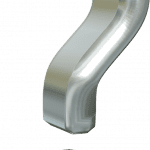
This idea came to me as I was responding to a claim that St. Gregory of Nyssa was an advocate of sola Scriptura. A bunch of quotes from that great Church Father were produced, where he talked about the authority of Scripture. I remarked on the Lutheran comment board where the original citations were posted (italics added presently):
It’s easy to pretend that these Fathers believed as Protestants do when you only cite one aspect of their beliefs and writings and omit equally important portions about Tradition and the authority of the Church and apostolic succession.
A half-truth is as bad as an untruth. If you only cite them writing about Scripture, with carefully selected tidbits, chosen for the Protestant “ear”, then they will sound like Protestants, especially if someone is predisposed to anachronistically read Protestantism into their views in the first place.
One could do that with my own writings, for heaven’s sake. If I am talking about Scripture, or material sufficiency, even perspicuity, I would sound a lot like a Protestant (taking those words in isolation), but I don’t believe in sola Scriptura at all. I think it is unbiblical, unhistorical, illogical and unworkable in practice.
This is why you must also see what these same Fathers think about Tradition, the Church, Councils, bishops, and apostolic succession, and then consider their entire view, not portions of it removed from immediate context and their overall thought.
And hence, inadvertently, an idea was born. Why not take a bunch of quotes from my own writings, using this same hyper-selective mentality that Protestant apologists use very often: of concentrating on one aspect of a person’s thought to the total exclusion of other aspects, crucially and necessarily related (by definition and concept) to the first?
Thus, by this method, one could “prove” that I myself espouse sola Scriptura, even though I have tons of writings where I (just like every Church Father) outright deny it and fully, enthusiastically accept the Catholic “three-legged stool” rule of faith, of Scripture, Tradition, and the Church in a seamless whole.
This will be great fun! Let’s see how many “prooftexts” can be produced, to establish beyond any “doubt”, that I, Dave Armstrong, Catholic apologist and convert from evangelical Protestantism, “believe” in sola Scriptura simply because I talk about the Bible a lot and hold it in the very highest regard.
All breaks below imply a break in the text, as these are excerpts, and each stands alone.
* * * * *
Sacred Scripture is true, and God’s inspired, infallible, inerrant written Word and revelation.
The Bible is central and primary . . .
Protestants believe that God protected Holy Scripture from error, by means of inspiration, even though sinful, fallible men wrote it. Catholics agree with that, . . .
(The Three-Legged Stool of Catholic Christian Authority: a Brief Explanation, 2001)
I do think Scripture is largely clear PROVIDED people are willing to follow it wherever it leads. . . . It is largely clear, . . . I still maintain that most doctrines are fairly clear in Scripture.
The Bible is something all Christians have in common. We all believe it is God’s inspired revelation. It is an objective document and collection of propositional data that we can work with in order to establish some foundational truths for ecclesiology and the basis of authority.
. . . seeking fundamental biblical truths that we can work with in this ecumenical setting, to determine more complex truths, by means of recourse to that which we all accept: the Bible.
All Catholic doctrines can be found in Scripture, either explicitly, implicitly, or by deduction from other explicit teachings.
[N]o Catholic teaching contradicts the Bible . . .
I think the Bible is pretty clearly understood even if read on one’s own, PROVIDED that the person is truly open to what the Holy Spirit is trying to say to them and teach them through the words of Scripture (whether a matter of morals and Christian life, or theology).
I don’t believe that Scripture itself is all that obscure or difficult to understand, at least not in its main outlines. I have never found that to be the case in any serious Bible study I have undertaken on my own (and I have done dozens of them, believe me). One should, of course, become acquainted with basic hermeneutical and exegetical principles.
It is good to read the Bible, because it is God’s inspired revelation to mankind.
That it is a good thing to read the Bible more, and a lot, as a bare proposition, is indisputable, . . .
I would say, furthermore, that – all things being equal – it would be a better thing to read the Bible without “outside” guidance, than to not read it.
The Bible is God’s very inspired words. How, then, can any Christian, NOT be passionately interested in it?
We take all of Scripture into account, not just our favorite pet verses and proof texts.
[I]t is also good to show forth a positive love for Holy Scripture, and that comes by reading it and becoming better-acquainted with its contents.
Of course merely reading a Bible doesn’t prove love of God. But a person who loves God will be very interested in reading His words. Why do I have to even argue that?
(“Why Don’t Catholics Read Their Bibles?”, 2002)
Scripture does teach that Scripture is inspired and infallible and inerrant, in many places, both explicitly and implicitly.
Scripture is what it is. 1 Timothy and other passages clearly teach inerrancy and inspiration. Therefore, they are biblical doctrines, because they are books in the Bible. Period.
[Y]ou haven’t shown that Scripture itself doesn’t teach that Scripture is inspired and infallible and inerrant.If you followed your logic consistently, you would end up with the absurdity of saying that no doctrine taught in the Bible is a biblical doctrine, because we can’t know for sure that any biblical book is in fact part of the Bible without non-biblical Tradition. Thus, by a reductio ad absurdum, this particular argument of yours collapses. It “proves too much.”
(The Canon of Scripture: Did the Catholic Church Create It Or Merely Authoritatively Acknowledge It?, 2004)
Just because learning and study are needed to correctly read the Bible and to attain to truth in theology, doesn’t mean that, therefore, the Bible did not already contain truth, or that human interpretation is “higher” than “God-breathed” biblical inspiration.
(Does the Catholic Church Think it is Superior to the Bible, and its Creator?, 2006)
[R]evelation ceased after the death of the apostles.
It is fundamental to biblical exegesis and hermeneutics that we compare Scripture with Scripture, for a full and accurate understanding.
(Reply to “CPA” (Lutheran) Concerning Bogus Notions of the Catholic View of the Bible, 2005)
We don’t believe that the Tradition we possess contradicts the Scripture.
. . . who believes in the material sufficiency, as I do . . . Tradition is more of a “commentary” on the always-central scriptural data, rather than a force in opposition to it . . . For us, as for the Fathers, Scripture is central, . . .
It is self-evident that the Bible is central and indispensable in any Christian perspective – no one need argue that.
[A]ll public revelation ceased with the Apostles.
The Holy Spirit, working in men’s hearts, will illuminate the truth for all who seek it . . .
(Dialogue on “Tradition” in the New Testament, 1996)
[N]ote that St. Vincent writes: “the canon of Scripture is complete, and sufficient of itself for everything, and more than sufficient.” This seems to me to be the notion of material sufficiency of Scripture, which is precisely the ground on which I am arguing . . .
(Dialogue on Whether Extensive Use of Biblical Arguments Reduces to a Quasi-Sola Scriptura Position?, 2003)
There are indeed several internal biblical evidences of inspiration and canonicity, . . .
(Are All the Biblical Books “Self-Attesting” and Self-Evidently Inspired?, 2006)
Scripture certainly is a “standard of truth” . . . even the preeminent one, . . .
Scripture is materially sufficient. In other words, every true doctrine can be found in the Bible, if only implicitly and indirectly by deduction.
(Quick Ten-Step Refutation of Sola Scriptura, 2004)
[W]e, too, accept the inspiration and infallible authority of Scripture.
Of course Jesus accepted the authority of the Old Testament. This is not in dispute.
Of course, the inspired revelation is pure and uncontaminated, . . .
[C]omparing Scripture with Scripture is an excellent way to do exegesis and systematic theology.
[I] accept the material sufficiency of Scripture. All true Christian doctrines can be found in Scripture, explicitly or implicitly, or clearly deduced from biblical evidences.
[T]here was such a thing as a written revelation, which was supremely important in the Christian life. But Catholics wholeheartedly agree with that and it is not at issue.
Of course the Fathers appealed to Scripture as supreme authority in doctrinal matters (so do Catholics; it is the overwhelming emphasis of my own apologetic and evangelistic ministry).
We are not saying that the Bible is radically unclear (we believe it is more often than not clear, and materially sufficient as well); . . .
It is not a matter of whether or not Holy Scripture possesses authority. It certainly does (and inherently, intrinsically so), as it is inspired, “God-breathed” revelation.
I’ve devoted my life’s work to showing that the Catholic positions are eminently biblical and not anti-biblical at all, with my website, Biblical Evidence for Catholicism, and first book, A Biblical Defense of Catholicism.
(Sola Scriptura: An Unbiblical Tradition: Refutation of Dr. John MacArthur and Richard Bennett, 2003)
I, too, believe all Catholic beliefs are explicitly or implicitly indicated in Holy Scripture (or harmonious with it), and accept the material sufficiency of Scripture . . .
[I]t is just as central and crucial to us as it was to the Fathers.. . . the Scriptures, which all Christians agree are inspired, “God-breathed” words.
. . . the fact that the Fathers constantly cited Scripture, too, . . .
I constantly appeal to the Scriptures . . .
[T]he Catholic Church’s doctrine is indeed entirely harmonious with Scripture (as I believe), . . .
I have searched the Scriptures up and down, too, to see if Catholic doctrine can be squared with it. I have concluded that it does . . .
Catholics appeal to the Scripture just as much as Protestants do . . .
(Critique of: Denying Sola Scriptura: The Attempt to Neutralize the Bible [by Gary DeMar], 1999)
Scripture is authoritative. It has inherent authority. All of it must be taken into account. All of these things are wholeheartedly accepted by Catholics.
No one denies that the Bible is unique.
(Why Sola Scriptura is Self-Defeating and False if it Isn’t in the Bible, 2004)
Catholics, too, accept “whatever was established by the proofs and teachings of the Holy Scriptures.” [Dionysius of Alexandria]
. . . the material sufficiency of the Scriptures, with which Catholics wholeheartedly agree. I utilize this method myself in almost all of my exegetical discussions with Protestants, and in papers such as my lengthy treatments of the Trinity and the Deity of Jesus. I argue that issues can be resolved by recourse to Scripture Alone (material sufficiency), . . . When I refute heresies such as Mormonism or the Jehovah’s Witnesses, I argue from Scripture.
Hippolytus severely criticizes heretics for not appealing to the Scriptures. This is what all Christians do. The Fathers do it, Catholics do it (it is the overwhelming emphasis of my own apologetics and evangelistic apostolate), . . .
Catholics, too, “demonstrate” things from the Scriptures.
(Reply to Jason Engwer’s Catholic But Not Roman Catholic Series on the Church Fathers: Sola Scriptura, Part I, 2002)
It is no novel thing for a Catholic . . . to compare Scripture with Scripture. I write entire books and dozens of papers where I consult Scripture Alone to make my arguments . . .
(Reply to Jason Engwer’s Catholic But Not Roman Catholic Series on the Church Fathers: Sola Scriptura, Part II, 2002)
I appeal to the Bible constantly in my own apologetic . . . The Fathers do that all the time.
(Did St. Athanasius Believe in Sola Scriptura?, 2005)
The widespread existence of evangelical Protestant commentaries and various lexicons, Bible Dictionaries, Concordances, and so forth, for the use of laypeople, is based on a presupposition that individuals without formal theological education can arrive at conclusions on their own. This is largely what I am attempting presently.
(Introduction to my first book, A Biblical Defense of Catholicism, completed in 1996)
It’s very simple: one can often find things in the Bible by oneself, with adequate study aids, and (hopefully) some basic background as to hermeneutics and exegesis. I do this now, and have done it for years. This is, of course, the theme of my website, and my upcoming book (A Biblical Defense of Catholicism). I’ve never been disappointed or “stumped” when studying Holy Scripture. It is always a glorious shining light, and unambiguous. . . . Holy Scripture is inherently what it is: God’s inspired, inerrant, infallible written revelation, . . .
[I]f you are on a desert isle with no one around, and a Bible, I believe you could be saved.
I also believe that Scripture is – in the main – “clear”.
I have stated in my papers that I believe that the Bible is, by and large, clear, . . .
(“Me, My Bible, and the Holy Spirit”, 2001)
I stated that if one had a Bible on a desert isle, and that’s all he had, sure, he could be saved. . . . I believe that all Catholic doctrines can be found in Scripture, either explicitly or implicitly or indirectly. If that is material sufficiency, then I am in that camp. . . . Catholics regard Scripture as central, . . . .
I recently put together a 66-page paper on trinitarian proofs, consisting virtually entirely of Bible passages (some commentary on the Greek), and one bow to Tradition: The Athanasian Creed (which I think everyone here would acknowledge). This is my approach.
The doctrine [the Trinity] can be proven from Scripture, indeed (material sufficiency), . . .
[I]s Scripture sufficient to refute Arianism on its own . . .? I think so, . . .
I write entire books and huge papers citing nothing but Scripture. . . . St. Athanasius made some extensive biblical arguments. Great. Making such arguments, doing exegesis, extolling the Bible, reading the Bible, discussing it, praising it, etc., etc., etc., are all well and good . . .
(The Sufficiency of Scripture and the Church Fathers (Particularly, St. Athanasius and the Trinity), 2003)
Therefore, it is beyond any reasonable doubt or question, that Dave Armstrong believes in the full authority of Holy Scripture, the primacy of Scripture, material sufficiency of Scripture, biblical inspiration, the perspicuity (“clearness”) of Scripture, and sola Scriptura, right? Right? RIGHT?????
Nuh-uh. I fully believe the first four things. I largely believe the fifth, with important qualifications, and flat-out deny and reject the sixth tenet. It’s all based on a very simple logical fallacy. This is why we swear in a courtroom, replying to the question: “do you swear to tell the truth, the whole truth, and nothing but the truth?” The above collection of my words is “the truth.” It’s also “nothing but the truth.” It’s all my words. I believe all of it. I haven’t changed my mind on any of this.
But it’s not the “whole truth,” because it omits crucial information as to what I believe about the Church, Tradition, apostolic succession, the canon, necessity of authoritative interpretation, councils, bishops, etc. In fact, many times above I cut out the first or last part of a sentence that delved into those other related areas. These selections do not prove that I believe in sola Scriptura. I obviously don’t, because I have renounced it over and over in many ways, throughout my writings. [after this paper was written, I wrote not just one, but two books, in refutation of sola Scriptura]
The only difference between this method of “prooftexting” with regard to myself, and the exact same one used to “prove” that the Church Fathers believed in sola Scriptura, is that they were pretty much unaware of the notion of “Bible as the only infallible authority altogether” — since it was invented by Luther and Calvin in the 16th century. Thus, the absence of denial makes it easier for Protestants to pretend that they accepted what they don’t deny. This doesn’t logically follow, of course (because one doesn’t think to deny what hasn’t crossed his mind), and the determination of what they actually did believe is obfuscated by the cynically selective pick-and-choose method of presenting their beliefs.
With me, on the other hand, it would be impossible to prove that I held to sola Scriptura, since, if anyone rummaged fairly through my writings on this overall topic, they would find many express denials of sola Scriptura and lengthy, involved arguments against it. But for the moment, we’re pretending that they don’t exist, and that all one knows of my opinions on the Bible [and Tradition], are the above statements.
Don’t fall for it. Don’t be taken in by some of the most elementary logical fallacies. In one well-known phrase, what people who use “prooftexts” are doing is “quoting out of context” — oftentimes even the immediate context of the remarks, but also in the sense of ignoring a person’s entire thought and not allowing it to be presented in its multi-faceted fullness and broad scope.
***
(originally 2-7-07)
Photo credit: Four doctors of the Church: left to right: St. Augustine, Pope St. Gregory the Great, St. Jerome, and St. Ambrose (1516), by Pier Francesco Sacchi (c. 1485–1528) [pubic domain / Wikimedia Commons]
***













